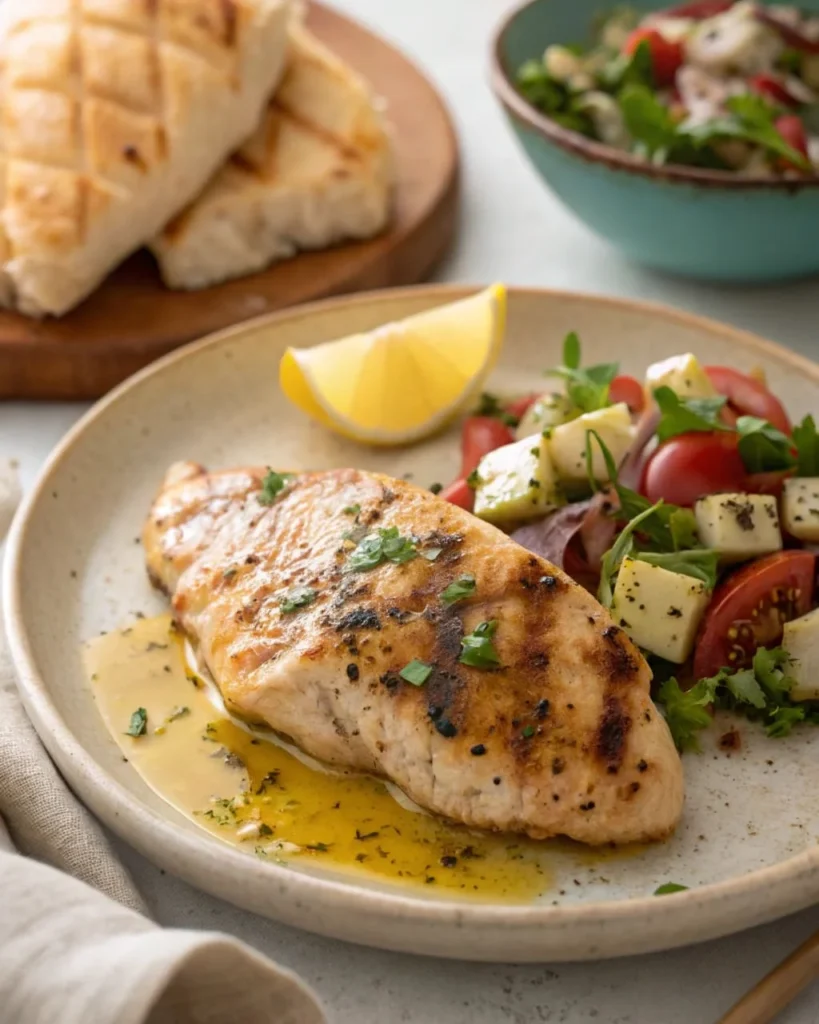Greek lemon chicken is a dish that embodies the vibrant flavors of the Mediterranean. It combines zesty lemon juice, aromatic herbs, and juicy, tender chicken to create a meal that’s both simple and rich in taste. Whether roasted with potatoes or grilled to perfection, this dish has been a staple in Greek cuisine for generations.
A Chef’s Perspective on Greek Lemon Chicken
“Greek lemon chicken is one of my all-time favorite recipes. It’s a dish that reminds me of warm family gatherings and the irresistible aroma of roasted garlic and citrus. The magic lies in the marinade—letting the chicken soak up the flavors ensures a tender, mouthwatering bite every time.” — Chef Nikos Dimitriou
Now, let’s explore the origins, ingredients, and secrets behind making the perfect Greek lemon chicken.
Part 1: Introduction to Greek Lemon Chicken
What Is Greek Lemon Chicken?
Greek lemon chicken is a traditional Mediterranean dish featuring chicken marinated in lemon juice, olive oil, garlic, oregano, and rosemary. It is often roasted alongside potatoes, allowing the flavors to meld beautifully.
A few key features of this dish include:
- Tangy and Savory Flavor – Thanks to the combination of lemon and herbs.
- Crispy Skin with Juicy Meat – When properly roasted, the chicken develops a crispy golden skin while staying moist inside.
- One-Pan Simplicity – Many recipes are made in a single roasting pan, making cleanup a breeze.
The Cultural Significance of Greek Lemon Chicken
Greek cuisine is rooted in fresh, simple ingredients and bold flavors. Lemon, in particular, plays a vital role in Greek cooking. It adds brightness to meats, seafood, and vegetables. Greek lemon chicken is more than just a meal—it represents the heart of Greek home cooking. Families have passed down their own versions of this dish for centuries, and it remains a favorite at gatherings and Sunday feasts.
“Lemon is one of the most important ingredients in Greek cooking. It doesn’t just add acidity—it enhances the depth of flavors and balances the richness of meats and oils.” – Chef Maria Georgiou
Nutritional Facts
Greek lemon chicken is not only delicious but also healthy and packed with nutrients. Below is a breakdown of its nutritional value per serving:
| Nutrient | Amount per Serving |
|---|---|
| Calories | 350-450 kcal |
| Protein | 40g |
| Fat | 18g |
| Carbohydrates | 10g |
| Fiber | 2g |
| Sodium | 600mg |
| Vitamin C | 25% of Daily Value |
| Iron | 15% of Daily Value |
With its high protein content, healthy fats, and essential vitamins, Greek lemon chicken fits perfectly into the Mediterranean diet, which is known for promoting heart health and longevity.

Part 2: Ingredients and Their Importance
Greek lemon chicken gets its rich, tangy, and savory taste from a handful of fresh and simple ingredients. Each ingredient plays a crucial role in balancing flavors and ensuring a juicy, tender bite.
Key Ingredients for Greek Lemon Chicken
Below is a list of essential ingredients for making authentic Greek lemon chicken:
| Ingredient | Quantity | Purpose |
|---|---|---|
| Chicken (bone-in, skin-on thighs or breasts) | 4 lbs | Provides rich flavor and retains moisture when roasted. |
| Fresh lemon juice | ½ cup | Adds tanginess and helps tenderize the meat. |
| Olive oil | ½ cup | Enhances moisture and gives the chicken a crispy golden skin. |
| Garlic (minced) | 6 cloves | Infuses the dish with a deep, aromatic flavor. |
| Dried oregano | 1 tbsp | A signature Greek herb that complements the lemony taste. |
| Kosher salt | 1 tbsp | Enhances the flavors of all ingredients. |
| Black pepper | 1 tsp | Adds mild heat and balances acidity. |
| Rosemary (dried or fresh) | 1 tsp | Contributes a warm, earthy aroma. |
| Cayenne pepper (optional) | 1 pinch | Introduces a slight kick of spice. |
| Chicken broth | 1 cup | Keeps the meat juicy and adds richness to the sauce. |
Pro Tip: For the best flavor, use freshly squeezed lemon juice instead of bottled juice. The natural acidity helps break down the chicken fibers, making it more tender.
Why Lemon Is Essential in Greek Cooking
Lemon is a staple ingredient in Greek cuisine, found in everything from salads to marinades. It plays multiple roles in Greek lemon chicken:
- Tenderizes the meat – The natural acidity breaks down proteins, making the chicken soft and juicy.
- Enhances flavor – Lemon’s bright and tangy taste balances out the richness of olive oil and roasted chicken.
- Creates a golden crust – When roasted, lemon juice helps the skin caramelize beautifully.
“Lemon brings out the natural flavors of food without overpowering them. It’s the secret to making Greek dishes taste fresh and vibrant.” – Chef Eleni Papadopoulos
The Role of Herbs and Spices in Greek Cuisine
Greek cooking relies on a blend of dried and fresh herbs to bring depth to dishes. The most common ones used in Greek lemon chicken include:
- Oregano – A signature Mediterranean herb with a slightly bitter, earthy taste.
- Rosemary – Adds a woodsy aroma that pairs well with lemon.
- Garlic – A must-have in Greek cooking, garlic deepens the savory flavor.
- Black Pepper & Cayenne – These spices enhance the dish with mild heat.
Each of these elements works together to give Greek lemon chicken its irresistible, well-balanced flavor.
Part 3: How to Make Greek Lemon Chicken
Now that we know the essential ingredients, let’s get into how to prepare Greek lemon chicken step by step.
Step-by-Step Recipe for Traditional Greek Lemon Chicken
Follow this simple method to make crispy, juicy, and flavorful Greek lemon chicken:
- Preheat the oven to 425°F (220°C). Lightly oil a large roasting pan.
- Prepare the marinade – In a bowl, mix lemon juice, olive oil, minced garlic, oregano, salt, black pepper, rosemary, and cayenne.
- Coat the chicken – Place the chicken in a bowl, pour the marinade over it, and let it sit for at least 30 minutes (or overnight for deeper flavor).
- Arrange the chicken and potatoes – If using potatoes, place them in the roasting pan and nestle the marinated chicken among them.
- Add broth and bake – Pour ⅔ cup of chicken broth over the chicken and bake for 20 minutes.
- Flip and continue baking – Toss the chicken and potatoes, then bake for another 25 minutes or until the skin is golden and crispy.
- Broil for extra crispiness – Turn on the broiler for 3 minutes to crisp up the skin.
- Make the sauce – Remove the chicken, add the remaining broth to the pan, and scrape up the flavorful bits. Pour the sauce over the chicken before serving.
Pro Tip: For a richer taste, marinate the chicken overnight. This allows the flavors to deeply penetrate the meat.
Cooking Methods: Roasting, Baking, and Grilling
Greek lemon chicken can be made using different cooking methods, each offering a unique texture:
- Roasting (Best for Whole Chicken or Thighs)
- Results in crispy skin and juicy meat.
- Requires high heat (425°F/220°C) for proper caramelization.
- Baking (Best for Boneless Chicken Breasts or Legs)
- A gentler cooking method that prevents dryness.
- Works best at 375°F (190°C) for 30-40 minutes.
- Grilling (Best for Chicken Breasts or Thighs)
- Gives a smoky flavor and crispy edges.
- Grill over medium-high heat for 6-7 minutes per side.
Best Side Dishes to Serve with Greek Lemon Chicken
Greek lemon chicken pairs well with many traditional Greek side dishes. Here are some delicious options:
- Lemon Roasted Potatoes – Soaked in the same marinade, they absorb all the flavorful juices.
- Greek Salad – A fresh combination of cucumbers, tomatoes, feta cheese, and olives.
- Tzatziki Sauce – A creamy dip made from yogurt, garlic, and cucumbers.
- Rice Pilaf – A light and fluffy side that complements the zesty flavors.
- Grilled Vegetables – Bell peppers, zucchini, and eggplant add a smoky contrast.
“A side of roasted potatoes cooked in the same pan makes this dish complete. The potatoes soak up all the lemony, garlicky goodness.” – Chef Andreas Kosta
For a delicious sandwich option, try our flavor-packed Chicken Parmesan Sub recipe, perfect for a hearty meal!

Part 4: Tips for the Perfect Greek Lemon Chicken
Even though Greek lemon chicken is simple to make, small mistakes can affect the final dish. Here are expert tips and tricks to ensure your chicken is always flavorful, juicy, and perfectly cooked.
Marinating Techniques for Maximum Flavor
Marinating is key to infusing the chicken with deep, citrusy flavors. Here’s how to do it right:
- Use fresh ingredients – Fresh lemon juice and garlic provide stronger, more natural flavors than bottled or powdered alternatives.
- Let it marinate longer – For the best results, marinate the chicken for at least 2 hours or, ideally, overnight. This allows the acid in the lemon juice to tenderize the meat.
- Massage the marinade into the chicken – Make sure every part is well-coated for even seasoning.
- Add a bit of Greek yogurt – Some recipes include Greek yogurt in the marinade to further tenderize the chicken while adding a creamy texture.
“A great marinade makes all the difference. The longer the chicken soaks up the flavors, the better it will taste when cooked.” – Chef Dimitris Karalis
Cooking Temperature and Time Guidelines
Cooking your Greek lemon chicken at the right temperature ensures crispy skin and juicy meat. Follow these temperature guidelines:
| Cooking Method | Temperature | Cooking Time |
|---|---|---|
| Roasting | 425°F (220°C) | 45-50 minutes |
| Baking | 375°F (190°C) | 35-40 minutes |
| Grilling | Medium-high heat | 6-7 minutes per side |
| Slow Cooking | Low heat | 6-8 hours |
- For whole chicken – Roast for 1 hour 15 minutes at 400°F (200°C), basting occasionally.
- For chicken breasts – Bake at 375°F for 25-30 minutes, ensuring they don’t dry out.
Pro Tip: Always use a meat thermometer! Chicken is fully cooked when the internal temperature reaches 165°F (74°C).
Common Mistakes to Avoid
Here are some common errors that can ruin the texture and flavor of Greek lemon chicken:
- Skipping the marinade – The flavors won’t penetrate deeply, making the dish taste bland.
- Not patting the chicken dry before baking – This prevents the skin from crisping up.
- Overcrowding the pan – Leaving space between chicken pieces allows them to roast properly rather than steam.
- Forgetting to baste – Spoon some of the pan juices over the chicken during cooking to keep it moist.
By following these simple but effective tips, you’ll make the perfect Greek lemon chicken every time!

Part 5: Variations of Greek Lemon Chicken
There are many ways to prepare Greek lemon chicken based on personal preferences, dietary needs, and available cooking tools. Here are a few popular variations to try.
Greek Lemon Chicken with Potatoes
One of the most traditional ways to prepare this dish is by roasting it with potatoes. The potatoes soak up the flavorful lemon, garlic, and herb-infused juices from the chicken, making them extra delicious.
How to Make It
- Cut 3-4 russet potatoes into wedges and place them in a baking dish.
- Toss with olive oil, lemon juice, oregano, garlic, salt, and pepper.
- Nestle the marinated chicken between the potatoes.
- Bake at 425°F (220°C) for 45-50 minutes, flipping halfway through.
- Broil for the last 3 minutes for extra crispiness.
Pro Tip: For a richer taste, add a sprinkle of crumbled feta cheese over the finished dish.
Healthy and Low-Calorie Adaptations
If you want a lighter version of Greek lemon chicken, here are some ways to cut down on calories without losing flavor:
- Use skinless chicken breasts instead of thighs to reduce fat content.
- Reduce the amount of olive oil to just 2 tablespoons while increasing lemon juice for moisture.
- Swap potatoes for roasted vegetables like zucchini, bell peppers, or asparagus.
- Skip the broiling step to avoid extra crisping oil.
This low-calorie version still keeps the bright, zesty flavors without the extra fat!
Instant Pot and Slow Cooker Versions
Want a hands-off way to cook Greek lemon chicken? Try making it in an Instant Pot or slow cooker!
Instant Pot Method
- Set the Instant Pot to Sauté mode and heat olive oil.
- Brown the marinated chicken on both sides for 2-3 minutes.
- Add chicken broth, lemon juice, and garlic.
- Close the lid, set to Pressure Cook (High) for 10 minutes, then allow a natural release for 5 minutes.
- Serve with roasted veggies or rice.
Slow Cooker Method
- Place the marinated chicken in the slow cooker.
- Add potatoes, lemon juice, olive oil, and seasonings.
- Pour in 1 cup of chicken broth.
- Cook on Low for 6-8 hours or High for 3-4 hours.
“Cooking Greek lemon chicken in a slow cooker makes it fall-off-the-bone tender with even more depth of flavor.” – Chef Eleni Stavros

Part 6: Health Benefits of Greek Lemon Chicken
Greek lemon chicken isn’t just delicious—it’s also packed with nutritional benefits. With lean protein, healthy fats, and essential vitamins, this dish fits perfectly into a balanced diet.
Nutritional Breakdown of Greek Lemon Chicken
Greek lemon chicken is naturally high in protein and low in carbs, making it an excellent choice for those looking to eat healthily. Below is a nutritional breakdown per serving (based on bone-in chicken thighs with olive oil and lemon marinade).
| Nutrient | Amount per Serving |
|---|---|
| Calories | 350-450 kcal |
| Protein | 40g |
| Fat | 18g |
| Carbohydrates | 10g |
| Fiber | 2g |
| Sodium | 600mg |
| Vitamin C | 25% of Daily Value |
| Iron | 15% of Daily Value |
How Greek Lemon Chicken Fits into the Mediterranean Diet
The Mediterranean diet is known for being one of the healthiest eating patterns in the world. It focuses on whole foods, healthy fats, and fresh ingredients, all of which are found in Greek lemon chicken.
- Rich in healthy fats – Olive oil provides heart-healthy monounsaturated fats.
- High in protein – Chicken supports muscle growth and keeps you full longer.
- Loaded with antioxidants – Lemon juice and garlic have anti-inflammatory properties.
- Low in processed ingredients – This dish contains no artificial additives or unhealthy preservatives.
By making small adjustments—such as using skinless chicken breasts and reducing oil—you can make Greek lemon chicken even leaner and healthier.
Protein, Vitamins, and Other Health Benefits
This dish is not just tasty—it’s also good for you! Here are some key health benefits:
- Boosts immune function – The vitamin C in lemon helps strengthen the immune system.
- Aids digestion – Lemon juice can stimulate digestion and improve gut health.
- Supports heart health – Olive oil and lean chicken contribute to better heart function.
- Builds strong muscles – With high protein content, this dish helps repair and grow muscles.
Did you know? Lemon juice can also help your body absorb iron from food more effectively, reducing the risk of anemia.
Greek lemon chicken is a nutrient-rich, flavorful meal that supports overall health while satisfying your taste buds.

Part 7: Frequently Asked Questions (FAQs)
Many people have questions about making Greek lemon chicken at home. Here are answers to some of the most common ones.
1. What spices are in Greek lemon chicken?
The key spices in Greek lemon chicken are:
- Oregano – A classic Greek herb that adds a warm, slightly bitter flavor.
- Garlic – Brings out a deep, savory taste.
- Black pepper – Adds mild heat and enhances the overall flavor.
- Rosemary – Gives a slightly woodsy aroma.
- Cayenne pepper (optional) – Adds a little spice for those who like extra heat.
These spices, combined with olive oil and lemon, create the signature Mediterranean taste of this dish.
2. Why is Greek chicken so tender?
Greek chicken is incredibly tender because of the lemon-based marinade. The acid in the lemon juice helps break down the chicken’s fibers, making it soft and juicy. Additionally:
- Olive oil locks in moisture and prevents the meat from drying out.
- Slow cooking or marinating overnight enhances the tenderness.
- Using bone-in chicken keeps the meat more flavorful and juicy.
3. What does putting a lemon in a chicken do?
When lemon is used in cooking chicken, it serves multiple purposes:
- Tenderizes the meat by breaking down proteins.
- Adds a bright, citrusy flavor that balances the richness of the dish.
- Creates a golden crust when roasted at high heat.
- Enhances juiciness by locking in moisture.
Lemon doesn’t just improve taste—it also helps create the perfect texture for your chicken.
4. Can I make Greek lemon chicken without an oven?
Yes! If you don’t have an oven, you can still enjoy Greek lemon chicken by trying these methods:
- Stovetop – Sear the marinated chicken in a pan over medium heat until golden brown, then cover and cook on low heat for 20-25 minutes.
- Grill – Grill chicken over medium-high heat for 6-7 minutes per side, brushing with extra marinade.
- Slow Cooker – Place the marinated chicken in a slow cooker and cook on Low for 6-8 hours or High for 3-4 hours.
Pro Tip: If you’re cooking on the stovetop, add a little chicken broth while simmering to keep the meat from drying out.
Final Thoughts
Greek lemon chicken is a must-try dish for anyone who loves fresh, bold flavors. It’s easy to make, packed with health benefits, and perfect for any occasion—whether it’s a family dinner or a weekend meal prep option.
Now that you know how to make Greek lemon chicken, why not try it yourself? Whether you bake, roast, or grill it, this Mediterranean classic is sure to become a favorite in your kitchen!
Print
Greek Lemon Chicken
- Total Time: 1 hour
- Yield: 4 servings 1x
Description
This Greek lemon chicken is a classic Mediterranean dish packed with zesty citrus, aromatic herbs, and juicy, tender chicken. Roasted to perfection with garlic, olive oil, and oregano, this easy one-pan meal is both flavorful and healthy. Perfect for a quick weeknight dinner or a family feast, this dish pairs beautifully with roasted potatoes, a fresh Greek salad, or warm pita bread.
Ingredients
Ingredients
For the Chicken:
- 4 pounds bone-in, skin-on chicken thighs (or chicken breasts)
- ½ cup fresh lemon juice
- ½ cup olive oil
- 6 cloves garlic, minced
- 1 tablespoon dried oregano
- 1 teaspoon dried rosemary
- 1 teaspoon kosher salt
- 1 teaspoon freshly ground black pepper
- 1 pinch cayenne pepper (optional)
- 1 cup chicken broth, divided
For Garnish:
- 1 teaspoon chopped fresh oregano
- Lemon wedges
Instructions
Instructions
-
Preheat the Oven
- Preheat your oven to 425°F (220°C). Lightly grease a large roasting pan to prevent sticking.
-
Marinate the Chicken
- In a large bowl, mix the lemon juice, olive oil, garlic, oregano, rosemary, salt, black pepper, and cayenne pepper.
- Add the chicken pieces, ensuring they are evenly coated with the marinade. Let it sit for at least 30 minutes (or overnight for best results).
-
Arrange in the Pan
- Place the chicken skin-side up in the prepared roasting pan. Pour ⅔ cup of chicken broth around the chicken.
-
Bake the Chicken
- Roast in the preheated oven for 20 minutes. After that, toss the chicken slightly and continue baking for 25 more minutes, until the skin is golden and crispy.
-
Broil for Extra Crispiness
- If needed, turn the broiler on high for 3 minutes to get extra crispy skin. Keep an eye on it to prevent burning.
-
Make the Sauce
- Remove the chicken from the pan and set it aside.
- Place the roasting pan over medium heat on the stovetop. Add the remaining ⅓ cup chicken broth and scrape up any browned bits.
- Strain the pan juices and drizzle them over the chicken before serving.
-
Garnish and Serve
- Sprinkle with fresh oregano and serve with lemon wedges. Pair with roasted potatoes, rice, or a Greek salad for a complete meal.
Notes
- Marinate Longer for More Flavor: Let the chicken sit in the marinade overnight for deeper, richer flavor.
- Use a Meat Thermometer: The internal temperature of the chicken should reach 165°F (74°C) before serving.
- For a Healthier Version: Use skinless chicken breasts and reduce olive oil to 3 tablespoons.
- Try Grilling Instead: If you prefer a smoky flavor, grill the marinated chicken over medium-high heat for 6-7 minutes per side.
- Best Side Dishes: Greek roasted potatoes, rice pilaf, tzatziki sauce, or a classic Greek salad.
- Prep Time: 10
- Cook Time: 50
- Category: Dinner
- Method: Roasting
- Cuisine: Greek, Mediterranean
Keywords: Greek lemon chicken, Mediterranean chicken, lemon herb chicken, Greek-style chicken, roasted chicken recipe, one-pan chicken, healthy chicken recipe


1 thought on “Greek Lemon Chicken”